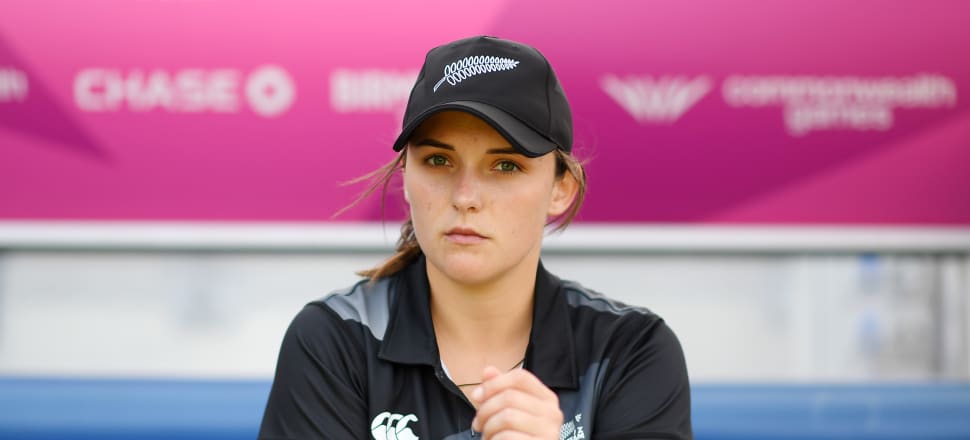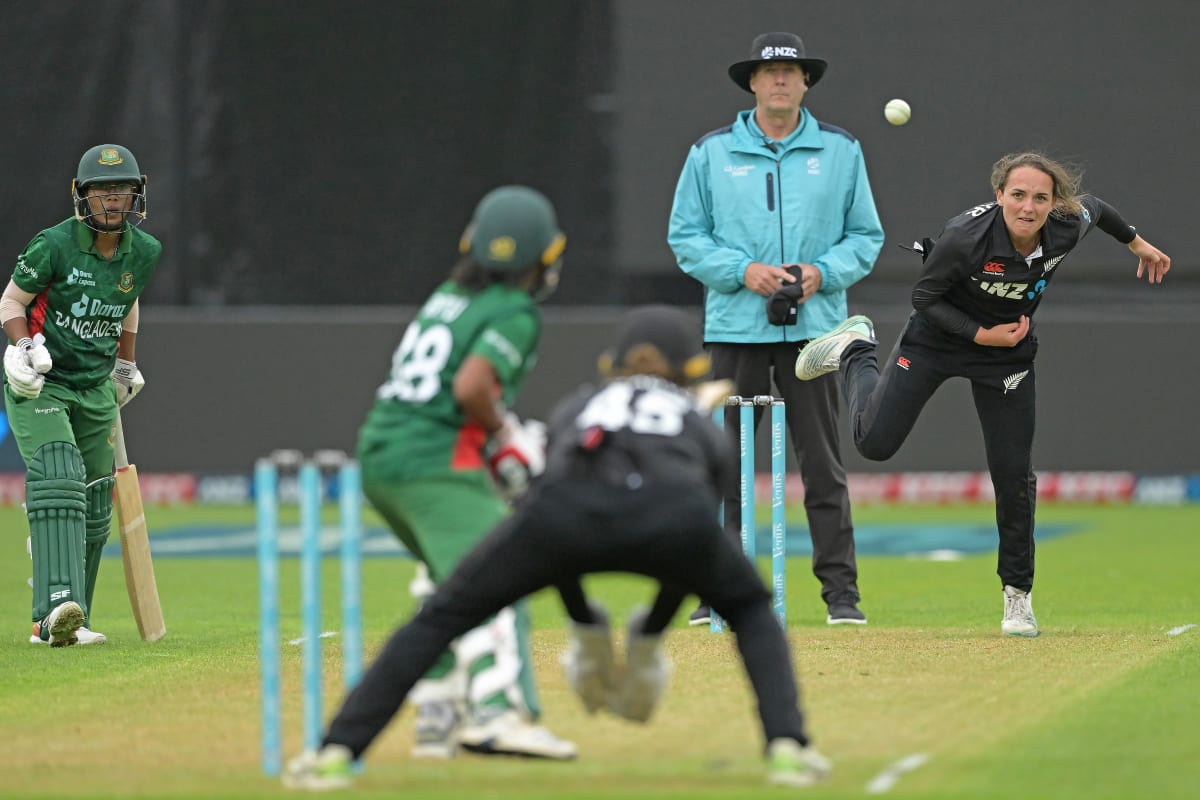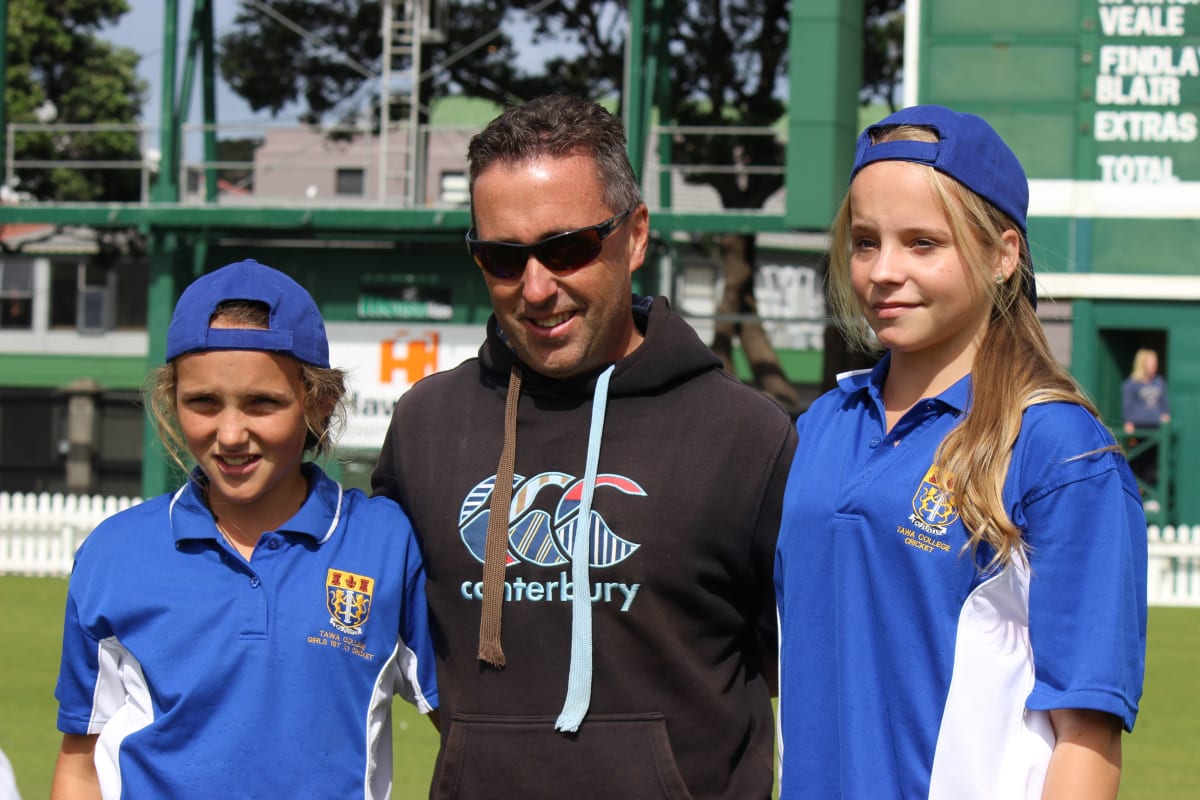
As the White Ferns go into their final game of 2022, Melie Kerr tells Kristy Havill how she's surprised herself this year, and how she hopes her video series on mental health will have saved at least eight lives.
It’s been just over 12 months since LockerRoom published the first detailed story of White Fern Melie Kerr’s brave battle with mental health and the courageous decisions she had to make to overcome her demons.
The 21-year-old pledged during our chat to do anything she could to make an impact in the mental health space. Just exactly what it looked like, she wasn’t so sure.
Fast forward to now, and she's just released the final episode of her video series, Treading Water, where she interviews seven people about their mental health struggles.
Not long after we’d wrapped up our Zoom interview, Kerr messages me to share an example of how the series is having an impact. She’d just had a note from a relative in Australia, who shared the link to the Treading Water videos with a mother battling with her mental health.
The woman then went to a hospital to get the help she needed.
READ MORE: * Amelia Kerr: My family saved my life * It's all going swimmingly for Kerr
“With the range of different stories, if that’s one different person saved for each video then that’s eight lives saved,” says Kerr, whose own monologue is included in the series.
“For me, that’s why I did it, because I know when you’re going through something how alone you feel. I wanted to raise awareness for the people feeling alone that it’s not just you, and these stories show hope we can get better.
"So I hope if someone is struggling and watches those videos, they can hang onto the hope that saved all of us and helped be where we are today.”

Over the last 12 months, Kerr has returned to cricket with a newfound confidence, after fearing she would struggle being away from her family and support network. "But now I know that with the White Ferns, I’m going to be ok because it’s like family," she says.
It was during the ICC Women’s Cricket World Cup back in March when the cogs started turning in Kerr’s head about what she wanted to do.
“After the summer of cricket and the World Cup finished, the idea just came to me. I shared it with Mum, who said it was really good, and then I got in touch with a psychologist who put me in touch with Mike King," Kerr says. A tireless mental health advocate, King runs the I Am Hope charity.
The purpose of Treading Water is to continue the conversations about mental health, and signal to those watching there's always hope to navigate through whatever life throws you.
There’s a mixture of family, friends and strangers among the videos. Some faces you will recognise, some you may not.
Partnering with I Am Hope was a logical move for Kerr, with the charity at the forefront of changing the dialogue around mental health and providing free counselling to young people.
It has been a passion project which Kerr worked on personally from all corners of the globe during her busy cricket schedule.
“I got the full publish of every trailer, every video and monologue when I first got to England, and very quickly got Covid soon after,” Kerr recalls, referring to her arrival in the UK in July ahead of the Commonwealth Games.
“I had a week in my hotel room, so that kept me busy."
A preview of Melie Kerr's monologue in the Treading Water series
While she was busy securing a bronze medal in Birmingham with her White Ferns teammates, then playing for London Spirit in The Hundred, she was also having a website built to house the videos and further establish her online presence.
By the time she linked back up with the Ferns in the West Indies in September, Kerr had something tangible off the field to sink her teeth into.
“With the release plan and adding stuff to the website, when I wasn’t at cricket I had a lot to do,” Kerr says. “I really enjoyed it, and it was easy to enjoy because it was work I liked and work that I’m proud of.
"I’ve done a few uni papers on tour before and that can feel like a drain at times.”
It demonstrates her growth and how far she's come that Kerr spent three months overseas before returning home for 24 hours, then jetting off again to Australia for the Women’s Big Bash League with the Brisbane Heat.
It was only last year when venturing away from her support system seemed an overwhelming prospect, and she withdrew from the tour of England.
“Before the India series [in NZ in February] and the World Cup I was nervous to get back on tour again,” Kerr reveals. “I was scared being back in a hotel room alone again that those bad thoughts would creep back in.
"They didn’t, and I love being with the White Ferns again. It’s been a hectic year, and I’ve surprised myself. I thought I was really going to struggle being away for so long.
"But I knew this time around if I did struggle I could talk about it or get home to my family.”

It’s that same progress and development at the cornerstone of the Treading Water series, each video demonstrating there's always hope to move through life’s difficulties and find support.
In terms of making the series, there was the minor matter of not just finding a videographer who could shoot and edit the content, but someone who could carry out the vision of the idea. And Kerr didn’t need to look far to find the man she wanted for the job.
“I always knew I wanted Hamish Johns to film it and work alongside me,” Kerr explains.
“He knew exactly what I wanted, and said he could see it straightaway. He’s done a few interviews for Cricket Wellington which have been epic, and his photography and stuff he’s done with film is incredible.”
Normally the one being interviewed in her day job, Kerr reversed the roles this project. Having confessed she doesn’t enjoy being in front of the camera, Kerr doesn’t doubt she's grown personally and professionally after taking herself out of her comfort zone. She found the process of telling her story therapeutic.
Treating each person with respect and delicacy was of the utmost importance, as some stories and experiences can be triggering for the individual recounting them. So she sought additional support and education to prepare herself as the interviewer.
She worked with Suzie McDonald, who runs the Headfirst programme at New Zealand Rugby around safe storytelling. And also with the Mental Health Foundation, who "helped with the ethical side of things of how to interview someone about this topic, and some safe questions to ask," Kerr says.
Choosing the people to be interviewed for the series was one of the most important factors Kerr considered, wanting as many different aspects of mental health issues to be discussed from a variety of individuals.
“I’d noticed more people in the media were speaking about mental health, but I also know how individual it is,” Kerr says. “Sometimes people who don’t have that profile don’t necessarily have a voice to share their stories to a wider range of people.”

Whether you’re a parent who doesn’t know how to best support their child like Kerr’s father Robbie, stuck in a career you don't love and experiencing burnout like Leigh Westley was, or grappling with an eating disorder as Rosa Flanagan did, a variety of topics are covered.
It was a priority for Kerr to have a rapport with each of her guests, where trust could be developed for a meaningful conversation. Some of these solid foundations she already had, such as with her father, her best friend, Dan Fouhy, and her cousin Eli Knox.
But for other guests like Two Raw Sisters co-founder and former NZ middle distance runner Flanagan, Wellington Saints basketballer Rangimarie Mita and former corporate employee Westley, there were a few coffees and lunches before the cameras started rolling.
“We just chatted more about life and what they do, nothing really about the interview, it was all about building that relationship and trust,” Kerr shares.
“From there we communicated about what they wanted to tell in their story, and what they don’t, and also making it clear they had full rights to cut anything out they didn’t like."
Perhaps the most high profile guest is Hurricanes flanker and Wellington Lions captain Du’Plessis Kirifi, who Kerr had met a few times and been impressed by his leadership and work in the Wellington region.
“His story is incredible,” Kerr says. “There’s so many young boys in New Zealand who look up to rugby players, and he shows that if you play sport you don’t have to pretend to be tough and not show emotion.”
A snippet from Wellington Lions captain Du’Plessis Kirifi's episode of Treading Water
There's one interview which sticks out clearly as the most difficult for Kerr and Johns to film. Her childhood best friend, Dan Fouhy.
“Dan came to me and said he wanted to be a part of it,” Kerr says. “I’d suggested it, but wasn’t too sure because it is the heaviest topic as it discusses suicide."
Fouhy lost his younger brother, Shaun, in 2020.
"We did his interview last, and that was important because Hamish and I felt we would have learnt as much as we could to prepare ourselves.
"We took a lot of breaks in the interview. There was a moment where Dan’s crying, I’m in tears, and you’re just going back and reliving the most terrible thing that’s ever happened to you and your family.
"I was around during the funeral and when it happened, around at their house a fair bit. It takes you back to those memories and all the pain it caused. I drove Dan home afterwards, and when I got home to my flat I just burst into tears. But it’s such an important story and one that’s very close to my heart.”
Each episode is raw, vulnerable, confronting at times, and inspiring. The courage of the guests to share their experiences is palpable, and all of the episodes are underpinned by a sense of gratitude they got the help they needed – in whatever form it came.
“If I get the funding, I’d jump at doing part two straight away”
Kerr has another busy summer ahead as the ODI series against Bangladesh wraps up this weekend, before joining the Wellington Blaze for the Dream11 Super Smash and beginning preparations for the T20 World Cup in February in South Africa.
“You play around the world now and with different teams, but there’s nothing better than playing for the White Ferns,” Kerr says.
“The culture we have and the people, I love being in that environment. Same with being back with Wellington and playing in the Super Smash, I absolutely love it.”
Kerr’s excitement and energy for the summer of cricket at home and spending time with loved ones can be felt through the screen.
When asked if there’s any chance of her having to take a break from cricket at some stage, Kerr concedes she will definitely be enjoying her leave period when it arrives after the World Cup.
“Normally I go straight back into training, but I should probably take some time off bowling and hitting balls this time around,” Kerr chuckles.
For all of her on-field accomplishments, these videos and the impact they’re having could live longer in the memory than her cricketing exploits.
It's surely up there with the most powerful digital and social media projects of the year in New Zealand, and is definitely one of Kerr’s proudest achievements.
So can we expect to see Treading Water part two, or any other projects in the future? “If I get the funding I’d jump at doing part two straight away”, Kerr says.
“Film’s very expensive, and all of the production for it, but it’s definitely something I’d like to keep doing. That’s where Mike King and I Am Hope helped me out this time around, otherwise I didn’t really know how to fund it.
"There are some amazing stories out there, and a lot of people I couldn't interview, because of heading away to England for cricket, are really keen to get their story out there.”
Whenever the time comes for part two, or another Kerr initiative, those who struggle with mental health or are associated with someone who does will know they have a lifelong ally and advocate in one extraordinary young woman.
* The White Ferns and Bangladesh play their third and final ODI in Hamilton on Saturday, from 1.30pm on Spark Sport
** To make a $3 donation to I Am Hope, text HOPE to 469







